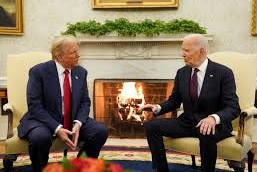1. Core Event: Controversy over the Legality of the Pardon
On March 17, Trump announced via social media that Biden's 'preventive pardon' signed before leaving office was invalid, arguing that the document was completed with an automatic signature pen, and that Biden was 'neither informed nor approved'. The pardoned individuals include former Congresswoman Cheney, former Chairman of the Joint Chiefs of Staff Milley, infectious disease expert Fauci, members of the Capitol Riot Investigation Committee, and relatives of the Biden family.
Trump accused Biden's team of 'forging the president's will' and hinted that the Department of Justice would launch a 'highest level investigation' into relevant personnel. The legal community is fiercely debating this issue: on one hand, the Constitution does not specify that pardons must be signed in writing, and automatic signature devices have been in use since the George W. Bush administration; on the other hand, the conservative think tank 'Heritage Foundation' claims Biden's signature is highly consistent, supporting Trump's doubts.

2. The Pardoned Individuals and Historical Conflicts with Trump
Anthony Fauci: Publicly opposed Trump's pandemic policies multiple times during the outbreak; Republicans accused him of 'covering up evidence of a virus lab leak' and pushing for a judicial investigation. Trump once threatened to 'sentence him to a hundred years in prison'.
Mark Milley: Secretly instructed nuclear weapon commanders in 2021 not to execute Trump's orders without his confirmation, labeled as a 'traitor' by Trump; in 2024, obstructed Trump's withholding of military aid to Ukraine, leading to direct conflict.
Capitol Riot Investigation Committee: Released a report in 2022 concluding that Trump 'orchestrated the overturn of the election', leading to personal threats against committee members from his supporters, including throwing Molotov cocktails and ricin letters.
Biden Family: Hunter Biden was indicted by the Department of Justice for tax fraud and overseas business dealings, while his brother James was accused of illegally profiting from China Huaxin Energy. Biden's pre-leaving pardon sparked 'abuse of power' controversy.

3. Dual Battlefield of Legal and Political Games
Constitutional Loopholes and Judicial Challenges: Biden's 'preventive pardon' (for the unconvicted) itself broke with precedent and was criticized as 'abuse of power'. Trump's camp attempted to invoke a 1929 Department of Justice opinion, arguing that 'the president must personally approve the content of pardons', but federal courts had ruled that 'the form of pardon is determined by the president'.
Escalation of Partisan Struggle: The Democrats accused Trump of launching a 'political purge', attempting to restart prosecutions against Biden's allies through the Department of Justice, even withdrawing Secret Service protection from individuals like Hunter; Republicans view this as a key battle to 'correct Biden's abuse of power', with conservative media claiming that 'the pardon war will determine the survival of the American system of separation of powers'.

4. Potential Impacts and Future Directions
Judicial Stalemate: If the court supports Trump's claims, Biden's pardon could be revoked, and relevant individuals would face criminal risks again, but such a ruling would overturn a century of pardon power precedent, triggering a constitutional crisis.
Increased Political Polarization: The incident has intensified the conflicts between the two parties, with Democrats planning to push for congressional hearings in response, while Trump may sign executive orders to directly intervene in judicial processes, further shaking the stability of the government.
International Ripple Effects: Among the pardoned individuals, Milley led military aid to Ukraine, and Fauci was involved in global vaccine distribution. If they are investigated, it could affect America's diplomatic credibility.

5. Historical Mirror: From the 'Watergate Incident' to the 'Pardon Storm'
This incident is likened to 'Watergate 2.0', but the nature is more complex:
Technical Subversion: Controversy over the legality of automatic signatures, exposing certification loopholes in executive power in the digital age.
Institutional Crisis: The presidential pardon power has devolved from a 'judicial corrective tool' to a 'partisan revenge weapon', highlighting the failure of American constitutional design.
Public Opinion Rift: Polls show that 76% of Republican supporters agree with Trump's assertions, while 82% of Democrats believe this undermines the 'foundation of democracy'.

Conclusion: A 'constitutional gamble' defining the future of America
This war over the pardon is not just a personal showdown between Trump and Biden; it is a stress test for the American system of separation of powers and political polarization. Its outcome could reshape the boundaries of presidential power and even become a 'political nuclear bomb' in the 2026 midterm elections. The world is closely watching: as 'legal battles' intertwine with 'public opinion battles', can America avoid slipping into the abyss of 'selective rule of law'?
Follow the blogger's homepage for more news updates.
